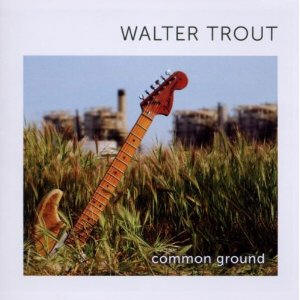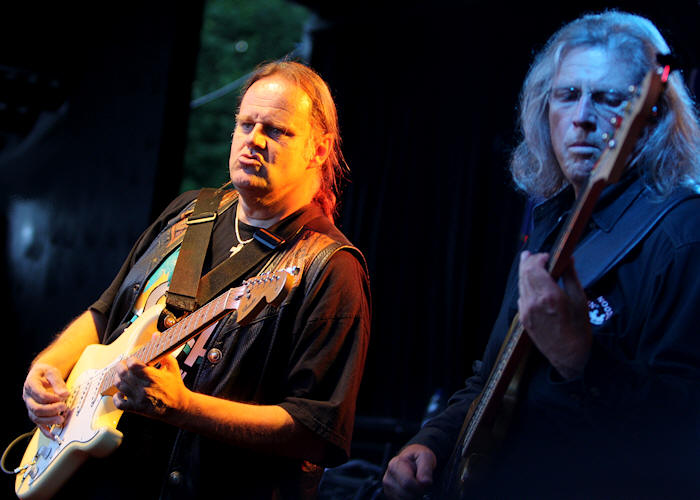
Painting © 2004 Loz
Arkle
Website
© Copyright 2000-2011 Alan White - All
Rights Reserved
Site optimised for Microsoft Internet Explorer
Early Blues Interview
|
|
"Walter Trout's
compelling music resides in a territory that unites the worlds of blues,
rock and pure sonic adventurism, where inspiration and technique meet to
create a unique soulful language. He spends much of his life bridging
the U.S. and Europe, where he is so well-known and respected that the
U.K.'s BBC Radio One places the Stratocaster master at number six on
their list of the Top 20 guitarists of all time. Legendary BBC disc
jockey Bob Harris, in his book "The Whispering Years," calls Trout: "The
World's greatest rock guitarist."
_________________________________________________________________________ I was fortunate to meet up with Walter and his band after their set at the Linton Music Festival: Alan: What are your first musical memories growing up in New Jersey?
Alan: How old were you then? Walter: I think I was in the womb. Alan: Did you come from a musical family? Walter: No, but my parents were aficionados. They took me to see James Brown, Ray Charles, a lot of jazz. My dad used to take me to Black Jack Clubs in Atlantic City to see Harry Belafonte. When I was 10 I got to spend the day hanging out with Duke Ellington and his orchestra, that was my birthday present from my parents, so they were pretty hip. Alan: Did you always want to become a musician? Walter: From a really age, yes. I knew I’d be on the stage and for a while I thought I’d be in musicals. My mum used to take me to Broadway and we’d see musicals, then I thought I’d be an actor and she took me to see Richard Burton as Hamlet but music took over by age 12. Alan: How did you get started? Walter: Well I studied the trumpet and I played that in orchestras in schools. The guitar I just played myself but I knew as soon as I found it. A buddy of my friend who I grew up with still tells this story every time I see him. He says he and I went to a store on Friday and I got an electric guitar, a really crappy one, right. He came over on Monday and I was going doooodiiiidooooo on it – he said it took me two days to learn how to play leads. Just happened quick. Alan: So what kind of material did you start playing? Walter: Anything. But really Bob Dylan and the Beatles were my big ones, and they sort of still are. Alan: I know you started playing trumpet in the school band as a teenager and then you switched to the electric guitar. What made you change to the guitar? Walter: Boy Dylan. I decided I wanted to get an acoustic and learn chords and sing folk songs. Along came the Beatles in the States in ’64. February 9th 1964, 8pm Philadelphia Channel 2, Ed Sullivan Show. At the end of that show my life was never the same. That was it. Alan: So what first attracted you to the blues? Walter: The simplicity of it. The potential to say a lot in a simple format. I had breakfast the other day with a very famous world renowned orchestra conductor and composer and we talked about that. His music is very complex, he studied under Leonard Bernstein but the genre doesn’t make a difference, it’s what you put into it. When I played with John Lee Hooker, we played one chord all night, E. That was it. But there was a lot of potential to say things in that E chord.
Walter: I have many memories but I don’t know how many of them should be bottled! Well, I got in John Lee Hooker’s band and the guys in the band said, “We’re going to play E, all night. You just play E. You don’t change. When he points at you, you play solo till you’re done and the rest of the night, play E.” For instance 'Stormy Monday' E, 'They call it Stormy Monday' E, 'Tuesday's just as bad' E, 'Wednesday's worse' E, right. I said “I’ve got it” and I had the E chord down. After 4 or 5 gigs I was trying to communicate with Mr Hooker and I said, “How come we’re not doing One Bourbon, One Scotch and One Beer, it’s your most famous song?”. And he said to me, “I don’t think you can follow the changes!”. Big Mama Thornton, she was near the end of her life and she was really small emaciated at that point. She dressed up like a man, wore a cowboy hat and was very cantankerous. She sat on a piano stool and she’d take her teeth out before we went on stage because it’d get in the way of her playing harmonica. We walked out one night and she started playing and realised she had her teeth in. She pulled her teeth out and said “Hey Walter, do something with these teeth”. At that point, I had to think, how badly do I want this gig? Am I actually going to take those teeth and put them somewhere? And I did. Alan: In the early 80s you joined Canned Heat and toured extensively with them. That must have been an experience for you?
Alan: I’ve got that, and yes it is good. And then you joined John Mayall’s Bluesbreakers playing alongside fellow guitarist Coco Montoya. Walter: Before that, when John had the original Bluesbreakers back together with Mick Taylor, John McVie and Colin Allan, I was asked by Mr Mayall if I would come and play rhythm guitar for Mick Taylor so I actually went out and did gigs in the States as a member of the original Bluesbreakers even though when they were making those albums I was 14 in school. So that was really a great experience. So I was actually in there before Coco but then I went back to Canned Heat and then John told me he didn’t want a band with the superstar guys but he wanted to get some LA guys and start a new band and I joined them. Alan: Good man, John Mayall. Walter: One of the best. I know that without those years with him and if he hadn’t done everything he did for me I wouldn’t be up there today. I know that and I owe him a lot. Alan: In ’89 you decided to move on, creating The Walter Trout Band touring in Europe and then became Walter Trout and the Radicals touring the US. How do you see the European scene compared with the US now? Walter: Well, in the European scene they all speak a different language – but other than that it’s city to city. We played a festival last night and it was fun but it was nothing like this [Linton Festival]. It depends on the audience, on the venue, that can happen in any country in any city. Alan: What do you think of Linton Festival and the gig today? Walter: (to his band) Hey you guys – am I making this up or was that like one of the best gigs we’ve done all year? Band Members: Yes, it was, without a doubt. Walter: It was definitely one of the best gigs we’ve done all year and it’s down to the audience. When they are that responsive you find new limits in yourself that you push and you go beyond.
Walter: I don’t know really, but probably still back to Bob Dylan and the Beatles, the Stones. Alan: What’s your favourite guitar? Walter: It’s my old Strad that’s at home. It’s the one that’s on all my records, on the cover, and I use it when I record but it’s home safe. It’s not just locked up, it’s hiding. I actually had to get a guy to come and get it for me because I couldn’t get to it, it's hidden pretty well. Alan: Any particular songs you play which have special meaning to you? Walter: Yeah. All of them. They have their own meaning, pretty much all of them. Alan: And what does the blues mean to you? Walter: I don’t know. Somebody asked me, “How do you define the blues?” and I went, “I don’t know. You tell me because I’m still trying to figure it out”. I love it and I think it has a lot of facets, a lot of different ways it can be played and approached and to me it can still be the blues, even if it’s not to a lot of “blues” purists. But I sort of don’t care. I actually discussed that with the orchestra conductor the other day. Snobbery. And I think it exists more in the blues world than in any other genre and I just find it’s ridiculous. I was telling him this whole thing about white guys can’t play the blues because it’s the music of black culture, and this cracked him up. I said to this orchestra conductor, “That means that Yo Yo Ma’s music is not valid and Kathleen Battle, one of the greatest opera singers in history and happens to be a black woman, her music is not valid either because Classical music is the music of white Europeans so what’s Yo Yo Ma doing playing it”.
Walter: Well, Sammy showed up one night and sat in. He came to Perks in Huntingdon Beach, sat in and he’s still here. That was 11 years ago. Rick Knapp – we were up in the Appalachian Mountains in Kentucky and he was sitting on a bridge playing a banjo. No, Rick Knapp, we met him at Indianapolis and he came up to me at a gig and said he played the bass and I thought that, well, I hear that all the time and I asked him who he plays with and he mentioned the guy who to me is the greatest blues drummer in history, I’m worshipful of this guy and he said “I play with Sam Lay” and I’m like “Yeah, right, sure you do”. Then he said, “Well, here’s his number, call him up” so the next day I dialled it up and Sam Fucking Lay answered the phone. I said “Is this really Sam Lay?”, and he said "Yeah, this is Sam Lay" and he started telling me, “Yeah, you know that Rick is good. He and me just made a record with some guy. His name is Steven Stills. I don’t know if you heard of him? He was with some band, Crosby, Stills & Nash or some shit.” I said, “Yeah, I’ve heard of Steven Stills”. And then he said, “Me and Rick’s recorded with him. The music sucked but they paid a lot of money”. [Thunderous laughter from the band!] Rick: That is exactly right. They paid a lot of money! Walter: Then I knew he was the real deal! And Mike there, he’s almost done 4 years. Mike: I’ll tell him the story. I was playing with Sammy’s brother, John Avila who’s the bass player for Oingo Boingo. I’ve known Sammy & John for 20 years. Sammy was on the phone with Walter and we were on a break from the gig and I asked Sammy, “Who are you talking to”, and he said “I’m talking to Walter”, and I grabbed the phone out of Sammy’s hand and said, “Hi Walter, my name’s Mike Leasure. You don’t know me but I’m your next drummer.” And six month’s later he needed a drummer and remembered that and asked Sammy to call me. We got together and I played two songs in his garage and he said “I want you to be my drummer”. Walter: But I was impressed with that attitude, that go get ‘em. Mike But more importantly, I saw some dessert up in the hospitality tent. Walter: So we’d better hurry up. [More laughter from the band]. Alan: So, quickly tell me about the making of your latest album, "Common Ground".
Alan: Finally, two or three years ago you did Colne Rhythm & Blues Festival and I was in the wings back stage and I was standing next to this young lad practicing on his guitar and next minute he was on stage with you. Mitch Laddie – do you remember him? Walter: Of course I remember him. I hooked him up with his record label and I invited him over to Amsterdam and he played at the Paradiso with me as a guest. We saw his Dad last night and he’s actually going to come and play as a guest with us at the Durham Blues Festival which is coming up. To me, he is the best of the young guys I’ve heard. He plays like a guy well beyond his years. It’s almost uncanny, he plays like he’s been at it 40 years. Alan: Good luck with the tour Walter and thank you for your time. Walter: No problem, thanks a lot, Alan. _________________________________________________________________________
"Hot on the heels of
last years career roundup and rarities collection "Unspoiled By
Progress", Walter Trout enters his seventh decade with a fantastic 12
track, all original, brand new album. There's certainly no sign of
a man resting on his laurels as he embarks on a record which sees him
traversing the entire gamut of Blues, from the raging opening track 'May
Be A Fool' on into the slow, acoustic tinged 'Open Book, the southern
rock styled 'Her Other Man', and on into the Hendrix styled 'No
Regrets'. Check out Walter Trout at the Linton Music Festival
_________________________________________________________________________
Return to
Blues Interviews List |








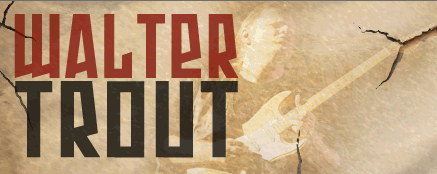
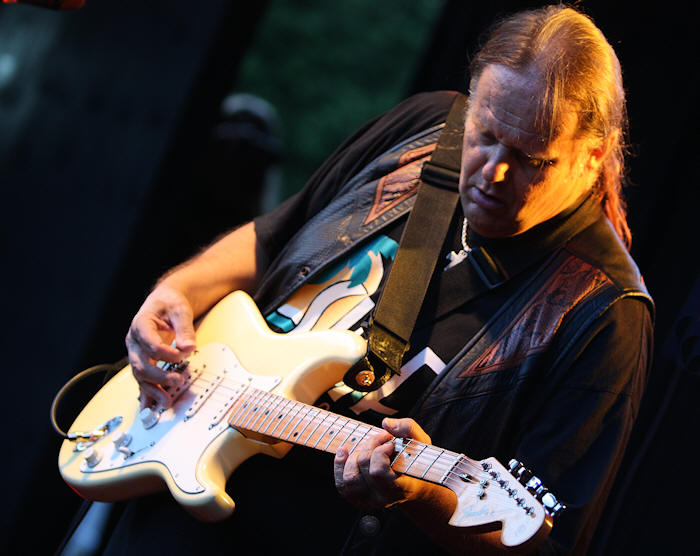
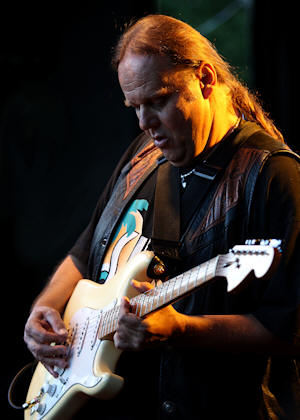 Walter:
A record called Mr Ponchinello: (Sings)...Knock...who is there...it is
Mr Ponchinello...Knock...who is there... Ponchinello with his
show.....he is a funny fellow....that’s why we call him Mr Ponchinello.
That was big in my house.
Walter:
A record called Mr Ponchinello: (Sings)...Knock...who is there...it is
Mr Ponchinello...Knock...who is there... Ponchinello with his
show.....he is a funny fellow....that’s why we call him Mr Ponchinello.
That was big in my house.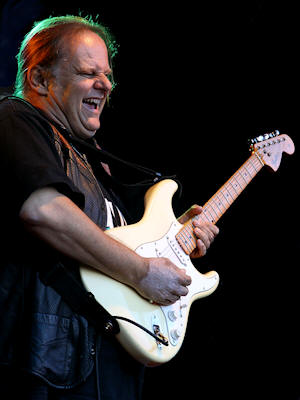 Alan:
In the ‘70s you packed your bags and went to California where you
backed the likes of John Lee Hooker, Lowell Fulsom and Big Mama
Thornton. Tell me a little about those times.
Alan:
In the ‘70s you packed your bags and went to California where you
backed the likes of John Lee Hooker, Lowell Fulsom and Big Mama
Thornton. Tell me a little about those times.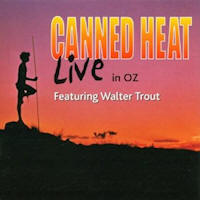 Walter:
I don’t remember any of it! I know I’m sort of one of the only guys left
alive who went through that band. They were a great band, we made some
good records. If you can get the live record we did, 'Live in Oz',
it’s a good record, man.
Walter:
I don’t remember any of it! I know I’m sort of one of the only guys left
alive who went through that band. They were a great band, we made some
good records. If you can get the live record we did, 'Live in Oz',
it’s a good record, man.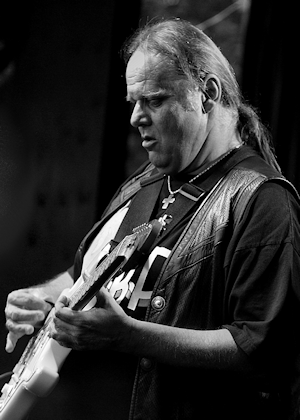 Alan:
Who’s influenced you the most in your music writing and playing?
Alan:
Who’s influenced you the most in your music writing and playing?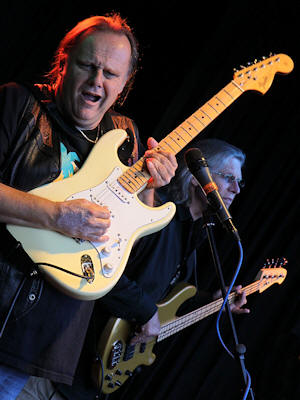 Alan:
Tell me about the band, when did you get together?
Alan:
Tell me about the band, when did you get together?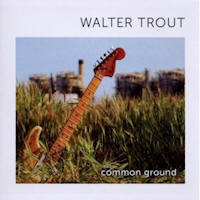 Walter: It
was produced by John Porter and I love working with John Porter, he’s
great. He’s just an awesome guy and he’s also a great guitar player.
He used to be second guitarist in Eric Clapton’s band and before that he
was the bass player in Roxy Music. He doesn’t like to talk about those
days but playing with Eric Clapton in the 70s he likes to talk about.
So he has some really great ideas about how to approach songs. For
instance I did a song on the album called 'Song for My Guitar',
which is a ballad and it came time to do the solo and I said I’m not
sure how to approach it. And he said, “You’ve got to start by playing
the melody. You just have to.” And that’s what I did and it’s
perfect. I just wouldn’t have thought of that.
Walter: It
was produced by John Porter and I love working with John Porter, he’s
great. He’s just an awesome guy and he’s also a great guitar player.
He used to be second guitarist in Eric Clapton’s band and before that he
was the bass player in Roxy Music. He doesn’t like to talk about those
days but playing with Eric Clapton in the 70s he likes to talk about.
So he has some really great ideas about how to approach songs. For
instance I did a song on the album called 'Song for My Guitar',
which is a ballad and it came time to do the solo and I said I’m not
sure how to approach it. And he said, “You’ve got to start by playing
the melody. You just have to.” And that’s what I did and it’s
perfect. I just wouldn’t have thought of that.